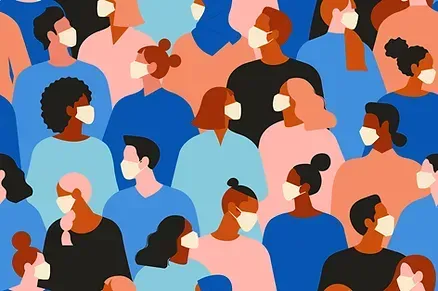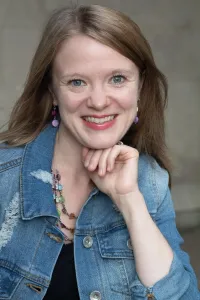
Check Out The Blog

Reflections on a Post-Covid Choral Season
This post was originally written in March 2022, about six months after I'd resumed live performing post-pandemic lockdowns. While, as a society, we've moved on and healed from many of the particular difficulties of those tough years, I hope this post can speak to anyone who is returning to singing after any kind of difficult experience that has shaken and challenged and altered them in some significant way. Please know that your struggles are real, and that you are not alone.

In spring 2020, when we were told that singing activities came with a higher-than-average risk of covid transmission and thus should be avoided until we had a vaccine, I was one of those singers devastated to the point of tears.
Choral singing was, and is, what I do as a singer. Along with concert solo work, it’s comprised the bulk of my career. So, naturally, I was really upset that covid, on top of everything else it had already upended, had taken this from me for the foreseeable future.
After I got over the initial disappointment, I became determined to do something vocally productive with my stay-at-home time. I practiced almost every weekday, at my own pace, singing whatever I wanted, which allowed me to develop a new level of vocal and physical awareness and experiment with new sounds and techniques. I did a few virtual choir projects, and even spearheaded two full-length virtual concerts for one of the groups I’d sung with prior to the pandemic. I recorded videos of some solo rep - art songs, arias, musical theater. In many ways, singing provided some structure to my days, helped to keep me mindful, and was a means of expression I hadn’t known I needed until that time.
You’d think that, after being so sad about the choral world being forced online or else ground to a halt, that my return to in-person ensemble singing would feel joyful, easy, natural, and like a relief.
The reality is that it didn’t. And I’m going to share why.
I think what I’m about to share is an important conversation for us to have as artists. I suspect I’m not alone in what I’ve felt over the last six months. I also think it’s important, as a mindset coach and voice teacher, to be transparent about my own difficulties. I think many singers, including my own clients and students, have had struggles in navigating a post-covid world, and it's important for them to know they're not alone, and that the difficulties they face are real and completely understandable given what we’ve been through.

In the fall of 2021, I started singing in-person again with two groups: one that I’d sung with prior to the pandemic, and another of which I was a new member. Both choirs began their rehearsals the same week. And let me tell you - it was all of the overwhelm.
For one thing, I’d just spent a year and a half at home, essentially never going out in the evenings. Simply being out past 9:00, and having to commute back and forth to Boston, felt exhausting. Furthermore, it was musically and vocally difficult: while I’d been singing consistently through all those months at home, that was quite different from a structured, two-and-a-half hour rehearsal singing difficult music, all while navigating afresh the demands of choral singing which to my pre-pandemic choral-singer self used to calibrate automatically - blend, balance, tone color, ensemble breathing and phrasing. Not only was my vocal stamina not there, but my sight-reading skills, which are excellent and have typically allowed me to read something with near-if-not-100% accuracy the first time through, were rusty. I was making musical mistakes I never would have made before; I was struggling vocally with things that previously would have felt comfy or at least doable.
Oh, and of course, we were singing in masks. Don’t get me wrong - I’m grateful that the masks help ensure everyone keeps their germs to themselves, covid and otherwise; and I’m super glad that both of my ensembles have been very sensible and covid-cautious. But singing in a mask presents challenges.
I knew that it would, of course. But I didn’t correctly anticipate the type of challenges I’d face. I was expecting it to be hard to gauge resonance and projection, or perhaps to feel as if I wasn’t taking in enough air for a phrase. These things were not really an issue, thankfully, but what I was not prepared for was how singing in a mask messed with my nervous system. During long, sustained phrases, or sections that demanded a lot of fast catch-breaths, I almost felt like I was hyperventilating, to the extent that my tone became unsteady and my throat became very tight, and I felt the need to take frequent breaths that felt like gasps. All of this, coupled with frustration about my rusty musical and vocal skills, led to general feelings of anxiety and stress around the whole situation, and I would leave rehearsal feeling so amped up that I’d be unable to sleep when I got home.
(It took me months to figure out that these issues were caused by the mask, by the way. I spent weeks thinking something was really wrong with me or my technique. Until I realized that I never faced any of these issues singing maskless in my own house. Again, I’m grateful for the germ containment, but also looking forward to the day when we can sing in groups without them.)

Rather than leaving me feeling fulfilled and happy, those first few months of post-lockdown choral singing challenged me in literally every way - physically, mentally, emotionally, and vocally. I think I was still happier to do be doing it than not, but it was nothing like the choral singing experiences I’d had prior to covid. Those had felt easy and natural. This felt effortful in every way, and I found myself wondering if I was cut out for it anymore. I wondered if this was just how it was going to be from now on, or if it was a phase that would pass.
I thought my first post-covid live concert in October would help. I thought I would be so overjoyed to be singing Bach with an orchestra for a live audience again that it would feel like the old days. It didn’t. Again, not that I wasn’t happy to be doing it, but it just didn’t spark the same feelings of joy and fulfillment that choral singing had given me before the pandemic, and I certainly felt like I hadn’t fully regained confidence in myself. I remember not being able to sing the very first entrance of that concert with the focus and strength the conductor wanted, because I’d been holding back tears since the orchestra began playing their opening bars. And they weren’t really tears of joy - they felt like tears of… not mourning, but certainly of the “this is hard” variety, an out-pouring of pent-up stuff that had been let loose by the overwhelming significance of the occasion.
I would say that it took about a full four months to get my feet back under me. It took a combination of encouragement from conductors and colleagues, some difficult but rewarding repertoire that gave me a much-needed kick in the pants, revisiting my breathing technique vis-a-vis my nervous system so I could survive while singing in a mask, and just plain ol’ doing the things until it all felt familiar again. By my February concert, which I think will forever remain one of the more challenging yet rewarding programs I’ve ever sung, I felt that old, pre-pandemic choral joy slowly making its way back in. When we finished the final “Amen” cadence of Handel’s epic Dixit Dominus, an uncontrollable smile spread across my face, and I knew then that I had turned a corner. (Too bad no one could see the smile, because masks.)

Now, six and a half months after those first difficult post-covid rehearsals, I can finally say I’ve regained my confidence - in myself, in my voice, in my musicianship. I’ve felt again and again the joy that this work gives me. It feels much more natural and easy than it did in the fall.
These past six months have been hard, but as with many hard things, there are lessons to be learned and discoveries to be made. Here are mine, in a nutshell:
Covid was, and still is, a collective trauma. And for many of us, there were also lots of non-covid-related traumas piled on top of that. Trauma changes the body, whether you notice it or not. It changes the brain and the voice, too. And so it’s completely to be expected that singing would feel different after going through all that. We aren’t the same humans we were two years ago. This would be true for any given two-year period, for change is always a constant; but it is all the more true after the utter transformation our society has undergone since 2020.
Nurturing yourself, and giving yourself time and space to process things and mourn losses, is really important. But so is moving forward. We cannot be stuck in the processing and mourning phase forever. Moving forward might feel incredibly difficult, but that doesn’t mean it’s the wrong thing to do.
The state of your vocal health is much more tied to your mental and emotional well-being than you think. As singers, we’re conditioned to think our technique will get us through anything. But as many experienced singers will tell you, there are sometimes problems that technique cannot fix. When you feel like your breath is dysregulated, like your throat is tight, like you can’t project - technique can help some of that, sure; but more and more, I think some of these vocal problems are reflections of the state of our inner selves. If you are feeling anxiety or uncertainty, experiencing epic decision fatigue, feel like your inner voice has been stifled, or like you’re shoving things down instead of releasing and processing them - this will come out in your singing.
So here’s my suggestion (*puts mindset coach hat back on*): if you’re a singer who feels like you’ve lost your confidence, your ease of vocal production, your sense of joy in what you do - by all means consult your voice teacher, coach, an SLP, or whatever other voice professional you need to. But also don’t be afraid to look inward. There are people who can help you do that - therapists, life or wellness coaches, even friends or family. By addressing your inner issues, you can cultivate freedom and beauty - including that which can be found in your singing. Your technique will be able to serve you even better.

My other suggestion - and hope - is that singers can be more transparent about their difficulties as we navigate a post-covid world. We’ve come a long way since 2020, but there is still a long way to go. There is a still a lot of recovery in our future, both as an industry and as individuals. I hope that, on both levels, we can continue to listen, to share, and to exercise discernment toward choices that will allow us to honor our own and others’ needs.
And let’s not forget to remind ourselves and others that what we do is beautiful and necessary.
